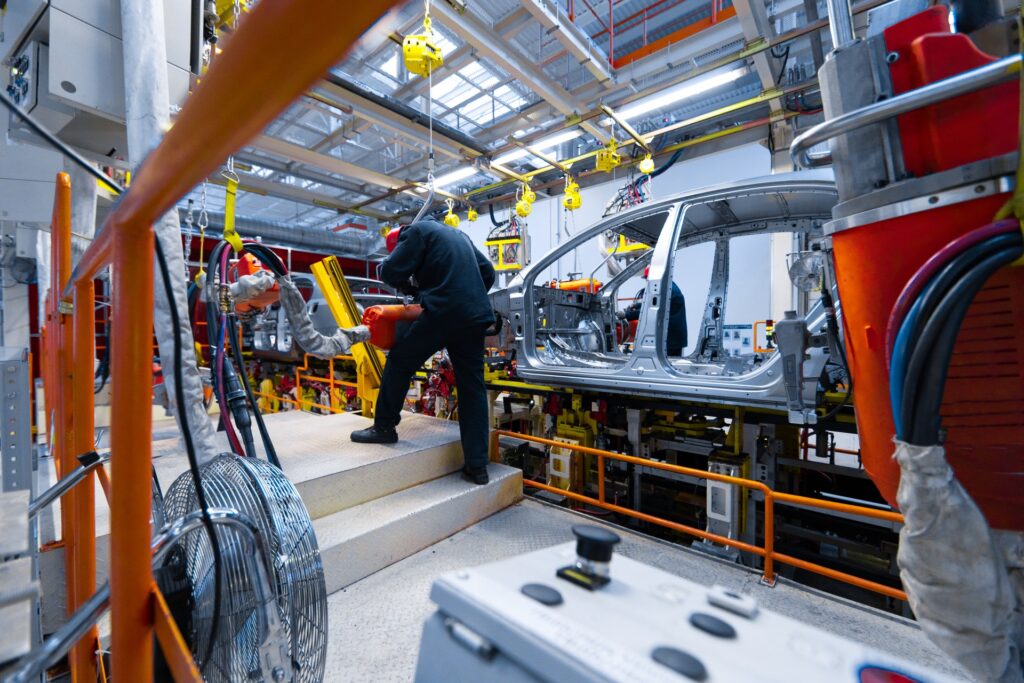UK car production CO2 emissions halved

Manufacturing your new car uses roughly the same amount of energy as the average household uses in electricity every year, data from the Society of Manufacturers and Traders has revealed.
Figures from the 2023 SMMT Automotive Sustainability Report show that it now takes 2.6 MegaWatt hours of energy to produce a single vehicle in the UK, compared to 3.9mWh in 1999. According to Ofgem, a medium-use household typically consumes around 2.9mWh of electricity annually – or 2,900kWh – in addition to typical domestic gas consumption of 12,000kWh.
The SMMT’s annual look at sustainability matters picks out 1999 as a benchmark, because C02 production during vehicle manufacturing has dropped 50 per cent – in 1999 C02 emitted during production was 1.1 tonnes per vehicle, but it has now fallen to 0.5 tonnes. Total C02 output from manufacturing has dropped by an initially dramatic 72 per cent since 1999, but the scale of the UK’s manufacturing output has fallen too – in 1999 the UK built close to 2 million vehicles (cars and commercials), but that figure only just topped 1 million last year. Other notable ‘per vehicle’ emissions improvements include a 53 per cent drop in the production of Volatile Organic Compounds.
The Sustainability Report also includes information on the social and economic impact of the automotive industry in the UK, and it’s notable that while vehicle production has halved since 1999, the number of people the SMMT calculates as relying on the automotive industry for income has dropped far less – from 907,000 to 793,000. Meanwhile, the number of people employed directly by the industry has dropped from 95,214 to 82,111, it says.
The SMMT says its report signposts the role automotive can play in the new Labour government’s plan for green growth. “We look forward to working with the new government to deliver its green growth agenda that puts Britain at the front of the queue for global investment and sustainability leadership,” says SMMT chief exec Mike Hawes. “Automotive can be the driving force behind this strategy, reducing carbon emissions still further while growing the economy, improving air quality and delivering new jobs and skills for people across the country.”
2023 saw significant declines in CO2 emissions, energy and water usage as Britain’s factories turned out their highest volumes in five years, exceeding one million vehicles. But last year was also momentous for the huge investments secured in our net zero transition, with almost £24 billion announced to produce a new generation of zero emission vehicles, electric batteries and components in the UK. These position our industry well for the future.
A Green Revolution Amid Global Competition
2023 was a landmark year for Britain’s automotive sector, showcasing remarkable progress in sustainability while reaching new production highs. The industry not only surpassed the one-million-vehicle milestone—the highest output in five years—but also significantly reduced CO2 emissions, energy consumption, and water usage.
This achievement highlights the sector’s ongoing commitment to greener manufacturing.
However, the real game-changer was the unprecedented investment in the UK’s transition to net zero. Nearly £24 billion was pledged to advance the production of next-generation zero-emission vehicles, electric batteries, and essential components. These investments strengthen the UK’s position as a leader in sustainable automotive innovation and pave the way for long-term success.
While these strides mark an exciting chapter in the country’s green journey, they come amid fierce global competition, with rival nations aggressively vying for international investment to bolster their own industries.
Maintaining a competitive edge is more challenging than ever, but Britain’s automotive sector continues to stand out—thanks to world-class research and development, a highly skilled and adaptable workforce, iconic brands, and an open economy.
Yet, industry leaders cannot afford to be complacent. Progress requires continued collaboration, innovation, and unwavering commitment to sustainability. The achievements of 2023 serve as a strong foundation—but success in the years ahead will depend on pushing even further in the global race for automotive leadership.
Looking to sell your current car quickly and for a good price? Or looking for a reliable used car, check out our showroom
You may also be interested in…

Headlight glare on UK roads to be measured
Car headlight glare on UK roads is to be measured by research company TRL has been commissioned by the government’s Department of Transport

CO2 emissions from UK car production halved since 1999
UK car production CO2 emissions halved Manufacturing your new car uses roughly the same amount of energy as the average household uses in electricity

Used Honda e (Mk1, 2020-2024) Review: desirable city EV
Ever since Honda launched its first model in the early sixties, it has been one of the world’s most innovative car brands. What do we

